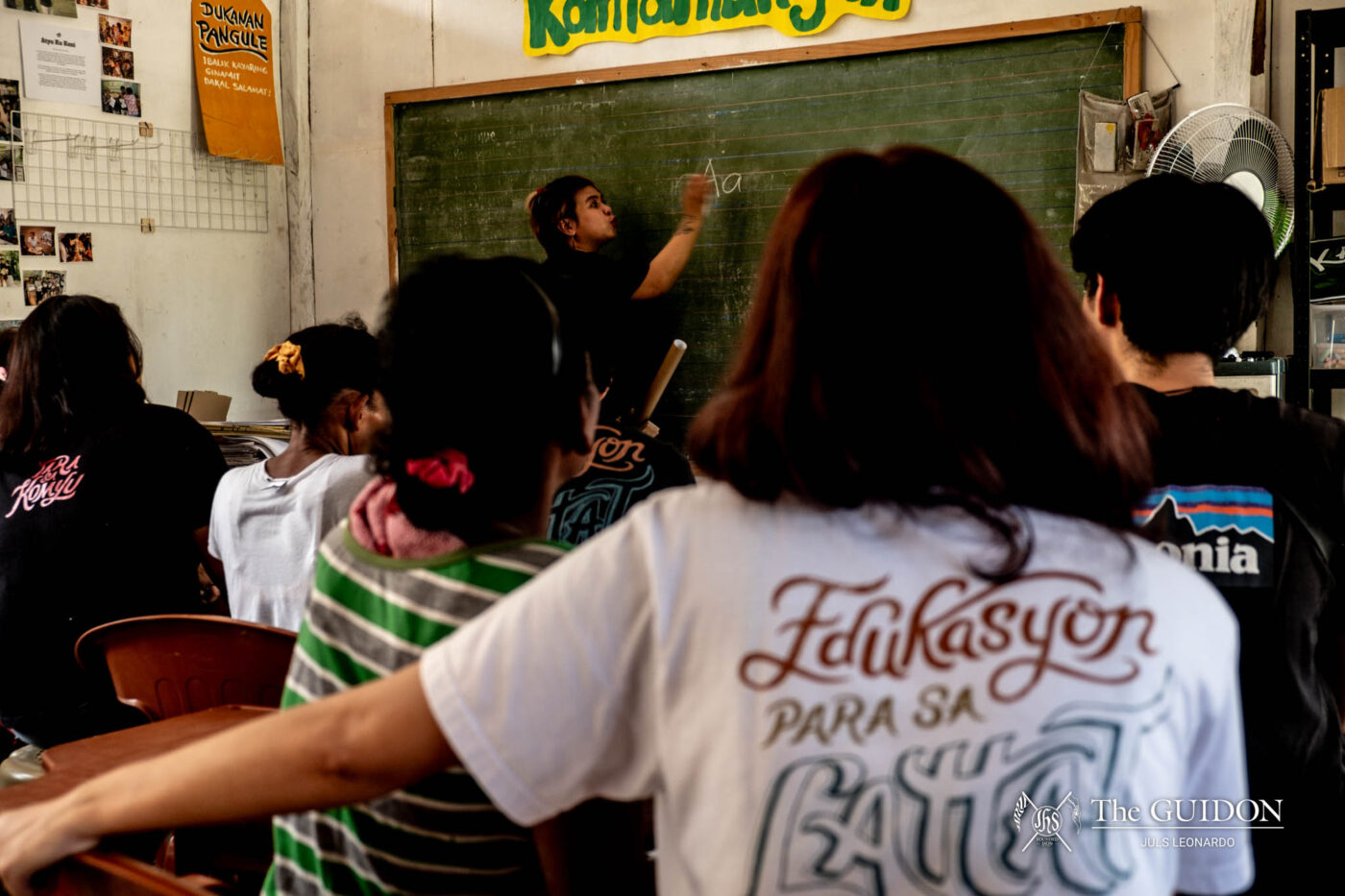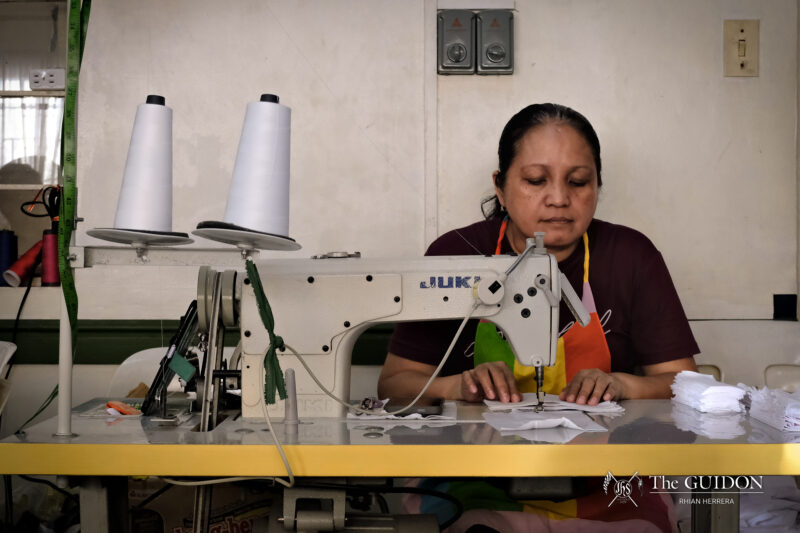Making up for lost time, Nanay Cory is a 60-year-old Aeta learner who diligently tries to read and write the same things her grandchildren learn at school.
THERE LIES a shanty house in Sitio Kalangitan in Capas, Tarlac. Its structure consists of incomplete insulated roofing, barely finished wiring, and adequately thin wooden pillars. Inside are a bunch of parols from last year’s Christmas party, a myriad of coloring books for children, and monobloc chairs and tables for students.
Every Sunday afternoon, Rocelle teaches a class filled with students. She is one of the founders of Liwanag at Dunong, an organization geared towards education for liberation and indigenous people’s rights.
Coming from Las Piñas, Rocelle travels every week to Tarlac to teach in the community. She takes up the mantle of catering to the different learning needs of her students, ranging from energetic eight-year-old children to timid 63-year-old fathers.
One of Rocelle’s students, Nanay Cory, enters the learning center as early as always. She sits alongside other adult learners, carefully writing and sounding out the letters with a volunteer as they prepare for an upcoming test.
Never too late
Sundays are a time for the community of Sitio Kalangitan to learn and bond with each other. Trading away their obligations—whether working in construction or caring for their children—parents also take brief moments to study and learn.
Instead of staying indoors, the children play and dance outside with volunteers. A few join the class inside, sitting alongside adult learners.
Nanay Cory is one of the mothers in the emergent class, focusing on basic reading and writing. After their one-hour session, she and other adult learners continue studying with volunteers outside the classroom to make way for the advanced class taking up math lessons.
As hesitant adult learners try to answer Rocelle’s questions in class, some mothers cheer their classmates on during recitation, exclaiming “Kaya mo ‘yan! (you can do this!)” to encourage their friends to do their best.
Despite these affirmations, Nanay Cory admits that she still feels embarrassed when she struggles in class. Still, she acknowledges how far she has come in her learning journey.
Nanay Cory recalls a time when she could not even write her own name. When a volunteer once asked her to write a certain word, she shared, “Nanginginig ako… Umiyak ako pero hindi ko pinahalata. (I was trembling… I cried a little but I didn’t let it show.)”
Noticing Nanay Cory’s fear, the volunteer gave words of encouragement. “Walang nakatapos nang hindi naghirap […], talagang ganyan lang talaga ang pagbabago. (No one has finished school without any hardship […], that is the nature of change),” he shared.
With a renewed sense of courage, Nanay Cory gradually progressed in her learning. Through the help of her grandchildren and volunteers, she is now able to write her own name and is now learning to construct and sound out different words.
Grassroots growth
What is now a learning center for everyone was not originally catered toward adult learners like Nanay Cory. According to Rocelle, the idea came about during one of the yearly Christmas gift-giving parties in the community.
During the celebration, one of the mothers asked Rocelle if it was possible to be given an electric post. She explained that during the pandemic, learning was done through modules, but children struggled to study at night and had to walk long distances just to charge their devices.
From this, Rocelle came up with a plan to create a small solar-powered hut for children to study in and charge their devices. A community consultation then led to a decision that the hut would also serve as a learning center for children on Sundays. However, progress in building the center was staggered and slow due to a lack of funds.
Nonetheless, volunteers and people in the area pledged a bit of time and money every week to build the structure. Driven by a sense of solidarity, the community gradually transformed the space into a safe haven where children could learn and play. Little did they know, the parents would soon follow in their children’s footsteps.
To this day, Rocelle still remembers those that have helped them. From indigenous people’s advocacy groups to a quaint milk tea shop owner in Caloocan, any and every support given has gone a long way.
Liwanag at Dunong was constantly in touch with the community. When the center was being built, a few mothers asked if they could learn as well. They were concerned they could neither read nor write their child’s names when they went to school.
Some adults initially shied away from entering the Sunday school but eventually joined after seeing what their fellow community members could achieve.
Aware of how adult learners come to the school with woes from getting exploited as indigenous people, Rocelle doubles down on liberating education. For her, education is not just about literacy but also about working alongside the oppressed.
Rocelle stresses that learning should include knowing one’s rights and thinking critically. She adds that education should bolster the community and prevent further exploitation, especially when illiteracy is leveraged by abusers. She shares that the adult learners had sessions about the Indigenous Peoples’ Rights Act so they could stand their ground against land-grabbers.
While liberating education is a large-scale endeavor, its benefits show in everyday life. Nanay Cory recalled a time when people would often deceive her by taking advantage of her difficulty to count.
These problems are close to the heart of the community. Aside from getting shortchanged, they know some of their fellow members are duped into selling their land through documents they cannot read. This difficulty of not knowing how to read and write is a sentiment shared by many adult learners in Sunday school.
From classroom to community
Indeed, the community faces bigger issues. The inflation in the prices of essential goods forces adult learners to work harder just to make ends meet. On top of taking care of her grandchildren, Nanay Cory shares that she sometimes struggles to afford rice for their meals.
When one of the community members gets sick, they would trek bumpy roads for hours just to visit the nearest healthcare center. The same goes for the children, walking on muddy paths only to be exhausted when they arrive at class.
The community is marginalized not only individually, but also systemically. Amid the development projects in Central Luzon, some members fall victim to land grabbing. Because of illiteracy in the community, the abusers trick parents and farmers into signing away their homes in exchange for a few sacks of rice.
Not long ago, a nearby landfill had affected a few water sources in the area. Rocelle and the community members watched as a hill was leveled in a span of a few months, allegedly to make way for a golf course.
With that, Sitio Kalangitan looks forward to the day they can stand firm against land-grabbers and abusers. Together with community members, Nanay Cory learns not only to read and write but also how to defend their home.
As Rocelle continues advancing education through Liwanag at Dunong, Nanay Cory remains dedicated to studying the lessons, hoping they will help her navigate life’s uncertainties as an Aeta learner, “Dapat pagtuunan ang pag-aaral. Kaya ako ngayon, kahit may edad na ako, gusto ko pa rin makapag-aral. Mahirap ang walang pinag-aralan.”
(Learning should be prioritized. Even at my age, I still want to learn. Life is difficult when you are uneducated.)







